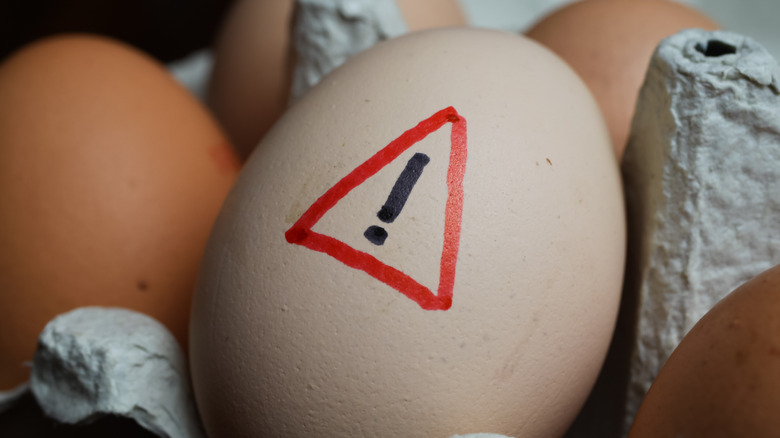This Is What Really Happens When You Eat Expired Eggs
Whether you like them scrambled, fried, or boiled, eggs are among the most popular foods consumed globally. According to the numbers revealed by Statistica, in 2020 alone, about 315 million eggs were consumed by people in the United States. Eggs are also massively utilized in industrial sectors, particularly in bakeries, large-scale production of mouthwatering desserts, and even in biotechnology where egg oil is extracted from the yolk, according to a 2012 study published in the Research Journal of Poultry Sciences.
Eggs are an incredibly fulfilling superfood, packed with numerous essential nutrients, such as proteins, multiple vitamins, and necessary fats needed to boost your energy. Thus, most people prefer eggs as the first meal of the day. Occasionally, you might have also come across an old, funny tasting, or a weird-smelling egg, giving off strong past-expiration-date vibes. That's when you face a real conflict: is the egg safe to consume or should it be discarded right away?
Is it safe to eat an expired egg?
According to Healthline, eggs that are way past their expiration date are usually contaminated by excess growth of a harmful bacteria called Salmonella. If consumed, you might be at risk of food poisoning and experience painful symptoms like puking, fever, and diarrhea. But if they were recently expired, the eggs could be safe to consume.
It also helps to know what bad eggs look and taste like. Powdery substances on the shell along with cracks indicate it's a spoiled egg. After cracking it open, a rotten egg would smell awful! If the egg yolk is bright-colored, it's fresh and okay to eat. Spoiled egg yolks may have red or white spots and visible discoloration. Food Network also recommends checking the egg white. If it's pink, discard it immediately as it might contain Pseudomonas bacteria.
In case you're still unsure about expiration, you can try the float test which is the easiest way to examine the freshness of eggs. Place the egg in a bowl with sufficient water. If it stays afloat, the egg is not fresh whereas if it sinks, it's safe to eat (via Medical News Today).
How to store eggs?
Being such an integral staple in every household, many people tend to buy eggs in bulk and store them for long-term use. This makes sense, considering it can be difficult to purchase eggs daily, especially if you have busy routines or live far away from shops. In such cases, it's best to buy cartons with a printed expiration or best before date. It's also important to store them properly to prolong their shelf life.
Dr. Lovneet Batra, a renowned nutritionist, explains in an interview with The Times of India, that the life of an unrefrigerated egg is barely a week to 10 days. If they are kept in a warm place instead of a cool environment, it can reduce their shelf life and the eggs go bad pretty soon. On the other hand, the eggs that are refrigerated in a carton or in an ice tray can easily last for up to a month. The egg cartons are specifically designed to absorb moisture from entering the shell and destroying the flavors, as stated by experts at Australian Eggs.



